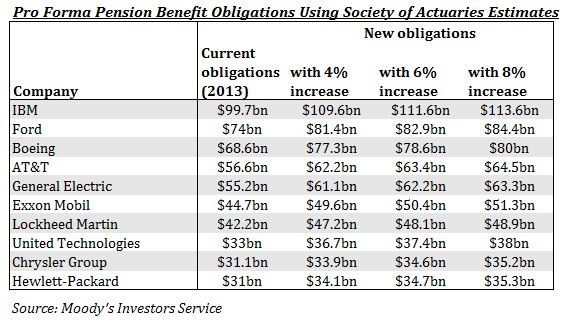US companies will have to find $110 billion in the next seven years to fund pension liabilities as life expectancy increases, according to ratings agency Moody’s.
Using data from new mortality tables published by the Society of Actuaries last week, Moody’s calculated significant increases in the amount of cash US firms would have to contribute to their defined benefit pensions in order to match growing liabilities.
The new mortality tables show male life expectancy at age 65 in the US has improved by two years since 2000, when the Society of Actuaries last updated its assumptions. For women, life expectancy at age 65 has improved by 2.4 years. This has resulted in an estimated increase of between 4% and 8% in company pension obligations.
Moody’s applied the calculations to the funding obligations for 10 of the biggest listed companies in the US. IBM’s funding obligations—which include servicing the pension fund as well as regular contributions adjusted for 2% inflation—were estimated at $99.7 billion in 2013, but Moody’s calculations showed this could increase to as much as $113.6 billion at the top end of assumptions.
 “Given these increasing liabilities and cash drains, we
expect to see an acceleration in lump sum offers and annuitizations similar to Motorola’s
recent pension plan restructuring, which, through a combination of
annuitizations and lump sum offers, it expects will reduce its [obligations] by
$4.2 billion,” wrote Wesley Smyth, senior accounting analyst at Moody’s.
“Given these increasing liabilities and cash drains, we
expect to see an acceleration in lump sum offers and annuitizations similar to Motorola’s
recent pension plan restructuring, which, through a combination of
annuitizations and lump sum offers, it expects will reduce its [obligations] by
$4.2 billion,” wrote Wesley Smyth, senior accounting analyst at Moody’s.
In September, ahead of the publication of the tables, Moody’s predicted the new data would trigger a rise in de-risking activity. This year has already seen several giant transactions, with the BT Pension Scheme, Motorola, Bristol-Myers, and two Dutch miners’ pension funds all engaging in de-risking deals.
Look out for CIO’s de-risking special issue, out this month—subscribe to the print or digital edition to get your copy.
Related Content: How Rate Increases Could Push Liabilities Higher & The Companies Threatened the Most by Pension Deficits
